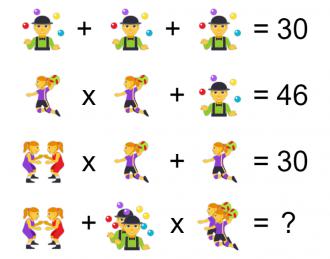Can you replace the question mark with a number?
MATH PUZZLE: Can you replace the question mark with a number?Correct answers: 137
The first user who solved this task is Alexander Filimonoff.
#brainteasers #math #riddles

Trying to be impressive
A young lawyer, starting up his private practice, was very anxious to impress potential clients. When he saw the first visitor to his office come through the door, he immediately picked up his phone and spoke into it," I'm sorry, but my caseload is so tremendous that I'm not going to be able to look into your problem for at least a month. I'll have to get back to you then." He then turned to the man who had just walked in, and said, "Now, what can I do for you?"
"Nothing," replied the man. "I'm here to hook up your phone."

